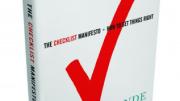Atul Gawande, surgeon, professor of medicine, and medical writer—and the subject of this September-October 2009 Harvard Magazine profile—has a new book out. Its title is The Checklist Manifesto: How to Get Things Right, and the reviews so far have been good. ("Freakonomics" blogger Steven D. Levitt declared it "the best book I've read in ages," noting that he didn't expect much from a book about checklists but devoured it in one sitting "against all odds.")
As the New York Times review notes, the book reprises Gawande's New Yorker writing about checklists as a tool to prevent medical errors, but includes new material: describing, for instance, his efforts to implement and test the checklist around the world with the World Health Organization—and the skepticism he encountered during this endeavor.
In an interview with Time magazine, Gawande tells how the checklist's effectiveness surprised even him:
I introduced the checklist in my operating room, and I've not gotten through a week without it catching a problem. It has been really eye-opening. You just realize how fundamentally fallible we are.
See also this Q & A with Gawande from the Boston Globe.






